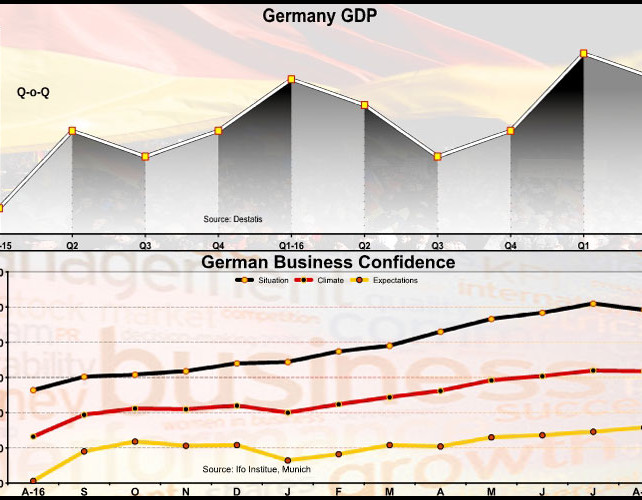
The German economy expanded in the second quarter largely driven by spending and investment amid weak net trade, official data showed Friday.
Confidence among German firms dropped slightly in August due to less positive assessments of the current business situation but overall sentiment remained close to a record high ahead of federal election next month.
Gross domestic product grew 0.6 percent sequentially in the second quarter, but slightly slower than the 0.7 percent seen in the first quarter, according to detailed report from Destatis. The rate matched preliminary estimate published on August 15.
On a yearly basis, GDP expanded by a working-day adjusted 2.1 percent, following a 2 percent growth logged in the previous quarter.
Price-adjusted GDP growth came in at 0.8 percent versus 3.2 percent a quarter ago. The statistical office confirmed the preliminary estimate.
Elsewhere, survey data from the Ifo Institute revealed that the business sentiment index fell slightly to 115.9 in August from July's record high of 116.0. The expected score was 115.5.
Reasons for today's drop in confidence could be the strengthening of the euro over the last few months, fresh geopolitical concerns with the US-North Korean conflict and fading signs of any imminent investment boom in the US, Carsten Brzeski, an ING Bank NV economist, said.
However, the best explanation for the drop is simply a small technical correction after three record-highs in a row, he noted.
With less than one month to go before Germany's federal election, today's data bode well for Angela Merkel's already-strong re-election prospects, Capital Economics' economist Stephen Brown, said.
Despite August's small fall, Ifo business sentiment remains buoyant and points to strong growth ahead, the economist added.
Ifo survey showed that the current situation indicator fell to 124.6 in August from 125.5 in July. Meanwhile, the expectations indicator rose to 107.9 from 107.3 a month ago.
The institute said the largest euro area economy remains on track for growth.
The expenditure-side breakdown of GDP showed that growth was underpinned by both household and government expenditure and investment.
Growth in private consumption doubled to 0.8 percent from 0.4 percent. Likewise, government spending advanced 0.6 percent after gaining 0.2 percent.
Gross fixed capital formation rebounded from the first quarter. Investment in machinery and equipment grew 1.2 percent and that in construction rose 0.9 percent.
As regards foreign demand, there were mixed signals. According to provisional calculations, exports of goods and services were up 0.7 percent. However, imports increased more substantially by 1.7 percent.
As a result, the net trade had a downward effect of -0.3 percentage points on GDP growth.
In a separate communique, Destatis said net lending of general government amounted to EUR 18.3 billion in the first half of 2017. As a percentage of GDP, this was a surplus ratio of +1.1 percent.
by RTT Staff Writer
For comments and feedback: editorial@rttnews.com
Economic News
What parts of the world are seeing the best (and worst) economic performances lately? Click here to check out our Econ Scorecard and find out! See up-to-the-moment rankings for the best and worst performers in GDP, unemployment rate, inflation and much more.
